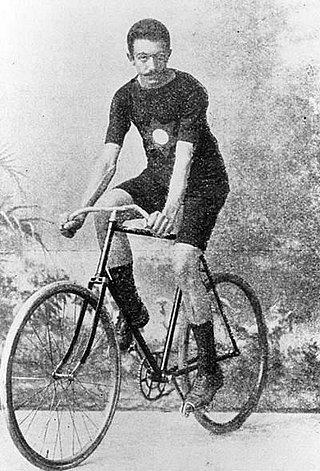
The men's individual road race was a cycling event at the 2004 Summer Olympics. It was held on 14 August 2004. There were 144 competitors from 43 nations. The maximum number of cyclists per nation had been set at five since professionals were allowed in 1996. The event was won by Paolo Bettini of Italy, the nation's first victory in the men's individual road race since 1992 and fifth overall. Sérgio Paulinho's silver was Portugal's first medal in the event. Belgium earned its first medal in the men's road race since 1964 with Axel Merckx's bronze.

The men's points race in cycling at the 2004 Summer Olympics consisted of a 160 lap points race with 16 sprints where points were awarded. The event was held on 24 August 2004 at the Athens Olympic Velodrome. There were 23 competitors from 23 nations, with each nation limited to one cyclist in the event. The event was won by Mikhail Ignatiev of Russia, the nation's first victory in the men's points race. Spain's Joan Llaneras, the defending champion, took silver; he was the first and only person to win multiple medals in the relatively short-lived points race, and ended with three medals after another gold in 2008. Guido Fulst of Germany took bronze, the first medal in the event for that nation since 1900.
Ryan Neville Bayley OAM is an Australian professional track cyclist and double Olympic gold medallist.
The men's track time trial in Cycling at the 2004 Summer Olympics was a time trial race in which each of the 17 cyclists from 13 nations attempted to set the fastest time for four laps of the track. Nations were limited to two cyclists each. The event was won by Chris Hoy of Great Britain, the nation's second consecutive victory in the men's track time trial. Arnaud Tournant of France earned silver after a disappointing fifth-place finish four years earlier. Stefan Nimke put Germany on the podium for the second consecutive Games with his bronze.
Stamatios Nikolopoulos was a Greek racing cyclist. He competed at the 1896 Summer Olympics in Athens winning two silver medals.

Felix Adolf Schmal was an Austrian fencer and racing cyclist. He was born in Dortmund and died in Salzburg. He competed at the 1896 Summer Olympics in Athens.
Edward Battell was a British racing cyclist. He competed at the 1896 Summer Olympics in Athens.
Theodor Ferdinand Leupold was a German racing cyclist from Zittau. He competed at the 1896 Summer Olympics in Athens.

Marie Léon Flameng was a French cyclist and a World War I pilot. He competed at the 1896 Summer Olympics in Athens, winning three medals including one gold.
Aristidis Konstantinidis was a Greek racing cyclist. He competed at the 1896 Summer Olympics in Athens.

Georgios Paraskevopoulos was a Greek cyclist. He participated in the 1896 Summer Olympics in Athens. Paraskevopoulos competed in the 12 hour race and the road race. According to the data provided by the official website of the Olympic Games, Paraskevopoulos did not finish the 12 hour race and there is no third winner. However, according to the Hellenic Olympic Committee, Paraskevopoulos did finish, and therefore is recognised by HOC as bronze medalist, having completed 940 laps of the Neo Phaliron Velodrome. This is supported by a short article in a Greek newspaper on the following day.

August von Gödrich was a racing cyclist from Austria-Hungary. He competed at the 1896 Summer Olympics in Athens.
Georgios Aspiotis was a Greek cyclist and publisher. He competed at the 1896 Summer Olympics in Athens.
Konstantinos Konstantinou was a Greek cyclist. He competed at the 1896 Summer Olympics in Athens.

Australia sent a delegation to compete at the 1936 Winter Olympics from 6 to 16 February 1936 in Garmisch-Partenkirchen, Germany. This was the nation's first appearance at an Winter Olympic Games since the competition began in 1924. Australia delegation consisted of one competitor. That was speed skater, Kenneth Kennedy who competed in three events in the speed skating competitions. He finished in 29th overall in the 500 meters and 33rd overall in the 1500 meters and the 5000 meters.

Miltiades, also known as Miltiades the Younger, was a Greek Athenian statesman known mostly for his role in the Battle of Marathon, as well as for his downfall afterwards. He was the son of Cimon Coalemos, a renowned Olympic chariot-racer, and the father of Cimon, the noted Athenian statesman.

The men's time trial was one of 5 track cycling events on the Cycling at the 1896 Summer Olympics programme. It was the fourth event on the cycling schedule and was held on 11 April. The first time trial competition was the only time that Olympic time trials were held over the distance of one-third of a kilometre; when the event returned to the programme at the 1928 Summer Olympics the distance was set at one kilometre.

The men's road race was the only road cycling event on the Cycling at the 1896 Summer Olympics programme. The course was 87 kilometres long and the race was held on 12 April. Seven cyclists from three nations competed. The event was won by Aristidis Konstantinidis of Greece. August von Gödrich of Germany took second, while Edward Battell finished third.

Damian Zieliński is a Polish cyclist. He was born in Szczecin. He competed at the 2004 Summer Olympics in Athens, and at the 2012 Summer Olympics in London.
Jeremy Adam Duvendeck is a retired American professional track cyclist. He represented the United States in two editions of the Olympic Games, and later claimed two elite national titles each in men's sprint (2003) and Keirin (2006) at the U.S. Track Cycling Championships. Before retiring to focus on his coaching career in 2009, Duvendeck rode for the Momentum Cycling Team.










